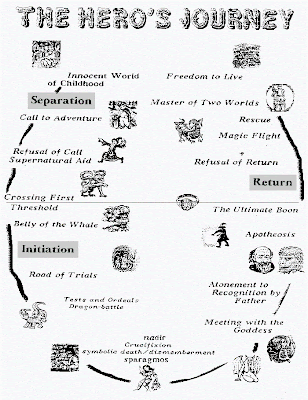There are essentially two overarching
ways of delivering narrative in a game: scripted narrative and
emergent narrative. Scripted narrative includes all the stuff like
dialogue and cutscenes, and also scripted action sequences like many
of the setpieces in the Uncharted
series. Emergent narrative is the stuff that emerges directly
from the gameplay, like how you took out a truck in Far Cry 2
by ramming a boat into it, or that time your Sim missed his carpool
because he wouldn't stop throwing a tantrum about being bored, or
that time a Creeper killed you in Mincraft and made you drop a
bunch of diamonds in lava.
In reality you can't escape emergent
narrative in games. Even during the most tightly scripted setpiece,
there will be some room for player-driven narrative, whether you plan
for it or not. Maybe the player doesn't notice the boulder hurtling
towards them, and casually walks into it instead. I guess you could
make a visual novel, which may or may not count as a “game,” but
this is getting a little off track.
I was recently watching Mission
Impossible 4 and got to the totally awesome Dubai scene where Tom
Cruise climbs the exterior of the Burj Khalifa (which he apparently did for real because... Tom Cruise). In the film he's using special spy gloves
that adhere to the wall but, in the middle of his climb, one of them
malfunctions! Can our hero make it the rest of the way with only one
glove? (spoilers: yes)
**{I dearly wanted to find the clip,
but to no avail. Paramount evidently does not want me
advertising their film.}**
Anyway it got me thinking, since in my
view there are basically two approaches for doing something like this
in a game.
Approach #1: you script a sequence
where the player has to climb a tower, but then have their glove
malfunction (after they pass the halfway point or something).
Approach #2: you present the player the
goal of reaching the top of a tower and you give them a bunch of spy
equipment which has, among its characteristics, some probability of
malfunctioning.
Both of these approaches have various
advantages and drawbacks. The main advantage of the first approach is
that you can ensure that everything plays out roughly how you intend
it, every time. You set up all the dominoes and choose when and where
they fall. The main disadvantage of the scripted approach is that,
similar to the Hollywood movie, your player most likely understands
that this is a scripted event, and knows that if they play properly,
they will escape.
Approach #2 is likely harder to pull
off well, design-wise (if the equipment failure is too sudden and extreme, it could just be really annoying), but I wish to argue that it not only provides
a potentially richer experience, but is also less development-heavy in the long
run.
Take a similar situation in Minecraft.
Let's say you're low on health and are trying to dig your way to the
surface, but just before you make it out, your pickaxe breaks. Now
you realize you have to get back to your chest to pick up some wood
so that you can craft a new pickaxe, all while avoiding spiders and
deadly lava.
In another game this could work as a
scripted sequence, certainly. But wouldn't it feel like arbitrary
backtracking if the game told you your pickaxe broke and now you had
to go back and make another in order to move on?
There is tendency right now for game
developers to want to make things “cinematic.” If a AAA studio
were designing the above sequence, they might add some musical cues,
some shaky-cam effects, and maybe hire Ron Perlman to go “Just my
luck!” And it might be totally awesome.
But Notch didn't have the budget to
hire Ron Perlman, so instead he built a world with some voxels and
some basic ground rules, and he figured out which ground rules made
that world interesting to inhabit. Notch may or may not have intended
the above scenario, and it might never happen to you, but then there
are a million other scenarios that just might.
Scripted sequences can be a powerful tool, but at the end of the day, what you tell your friends about are those moments when you took out like four guys with a single sniper bullet, or when you flew off your motorbike and landed in a kiddy pool, or when your spy glove gave out but you still managed to reach the top.
I'm not arguing that all games should
be “sandbox games,” whatever that term means exactly. I think there is
lots of happy middle-ground between experiences entirely crafted by
the designer, and experiences entirely invented by the player. What I
am saying is that it's wrongheaded and inefficient to try and craft
every part of a gameplay experience because ultimately, no matter how
“cinematic” you make them, those moments will never be
significantly better than their film equivalents. Whereas when you
give up some control, and design in a way that allow for things to
happen organically, a game can be so much more than the sum of its
parts.








